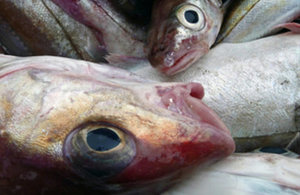UK fishermen see next phase of the discard ban take effect
New rules from 1 January mean fishermen targeting certain demersal species such as haddock, sole and plaice must land all their catch.

Haddock
Fishermen targeting certain demersal species such as haddock, sole and plaice must land all their catch, Fisheries Minister George Eustice has announced.
The demersal discard ban taking effect 1 January is is the latest phase of the wider discard ban which will bring an end to the wasteful practice of throwing fish back, dead, overboard.
Commenting on the start of the demersal discard ban, Fisheries Minister George Eustice said:
It is essential that we put an end to discarding, and the start of the demersal ban marks a significant milestone in achieving this.
We fought hard to achieve the discard ban through our reforms to the Common Fisheries Policy (CFP) – it is one of the most important changes to fisheries management since the creation of the CFP and is crucial to making our fishing more sustainable.
Together with careful quota management the discard ban will help us to achieve our shared ambitions of a profitable fishing industry by protecting our fish stocks for the future and safeguarding a healthy marine environment.
The demersal ban follows the successful introduction of the pelagic landing obligation in January 2015, targeting mid-water species such as blue whiting, herring and mackerel.
To support industry and help fishermen adapt, the ban will be gradually introduced in phases, and a number of flexibilities such as more freedom to bank and borrow quota and funding for new fishing gear will be available.
To help fishermen adapt the government has secured:
- increased quotas from the European Commission – to take account of the fact that discarding should no longer be occurring.
- exemptions to the discard ban – based on the survivability of a species if returned to the sea once caught or the costs of handling undersized fish onshore.
- European Maritime and Fisheries Funding – those adapting to the discard ban will be able to part-fund the purchase or development of innovative gear for more selective fishing or to help develop new markets for fish that were previously discarded.
Crucially we are delivering our manifesto commitment to support the smaller, inshore fleets and ensure sustainable stocks for the future. These vessels will receive more than 1,000 tonnes of uplift to support smaller scale fishermen as they adapt to the discard ban.
The UK government fought hard to deliver a better deal for the UK fishing industry at December Council and secured significant quota increases for many species including North Sea cod and haddock, Channel plaice, Celtic Sea hake and Western Channel sole. Together with the uplift, this means positive and substantial quota increases for 2016.
Further information
- The pelagic discard ban came into effect in January 2015. This has meant all fishermen targeting mid-water species, such as mackerel, have had to land all the fish they catch.
- The demersal discard ban will come into force on 1 January 2016. This has means fishermen targeting certain seabed species, such as haddock will have had to land all their catches of this species. Both the pelagic and demersal discard bans are putting an end to the million tonnes of fish that had previously been thrown back every year, dead, into European waters.
- The demersal landing obligation is being gradual phased in, a complete ban on the discarding of all quota species will be in place by 2019.
- The first 100 tonnes of any quota uplift received and 10% of any remaining uplift will be given to the inshore fleet; representing over 1,000 tonnes of uplift quota for 2016.
- The Marine Management Organisation (MMO) provides guidance for fishermen impacted by the demersal landing obligation. This outlines which fish come under the new landing obligation, what fishermen have to do with them on board, and which can be sold for human consumption.
- Guidance on the landing obligation can also be found on the European Commission’s website.
- For more information, contact Defra’s out of hours number on 0345 0518486.